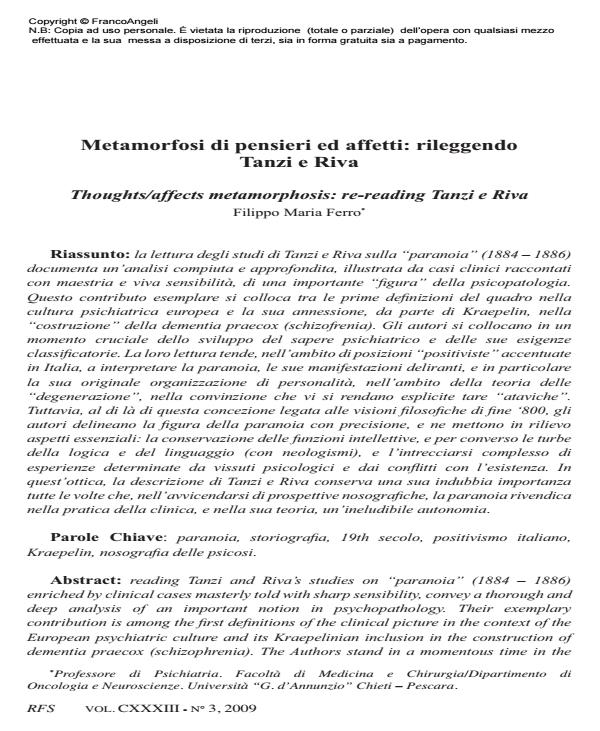Metamorfosi di pensieri ed affetti: rileggendo Tanzi e Riva
Titolo Rivista RIVISTA SPERIMENTALE DI FRENIATRIA
Autori/Curatori Filippo Maria Ferro
Anno di pubblicazione 2009 Fascicolo 2009/3 Lingua Italiano
Numero pagine 11 P. 97-110 Dimensione file 317 KB
DOI 10.3280/RSF2009003003
Il DOI è il codice a barre della proprietà intellettuale: per saperne di più
clicca qui
Qui sotto puoi vedere in anteprima la prima pagina di questo articolo.
Se questo articolo ti interessa, lo puoi acquistare (e scaricare in formato pdf) seguendo le facili indicazioni per acquistare il download credit. Acquista Download Credits per scaricare questo Articolo in formato PDF

FrancoAngeli è membro della Publishers International Linking Association, Inc (PILA)associazione indipendente e non profit per facilitare (attraverso i servizi tecnologici implementati da CrossRef.org) l’accesso degli studiosi ai contenuti digitali nelle pubblicazioni professionali e scientifiche
Metamorfosi di pensieri ed affetti: rileggendo Tanzi e Riva - reading Tanzi and Riva’s studies on "paranoia" (1884 - 1886) enriched by clinical cases masterly told with sharp sensibility, convey a thorough and deep analysis of an important notion in psychopathology. Their exemplary contribution is among the first definitions of the clinical picture in the context of the European psychiatric culture and its Kraepelinian inclusion in the construction of dementia praecox (schizophrenia). The Authors stand in a momentous time in the evolution of psychiatric knowledge and its needs for classifications. Their hypothesis, which follows "positivistic" ideas strong in Italy at the time, tends to interpret paranoia, its delusional expressions and, in particular, its peculiar personality organisation, in the context of the "degeneration" theory, in the belief that paranoia displays "atavistic" defects. Nevertheless, beyond this concept, linked to end of eighteenth century philosophical views, the Authors outline the subject of paranoia with precision, highlighting its essential features: the conservation of intellectual functions, despite the presence of disturbances affecting logic and language (with neologisms), and the complex interweaving of experiences caused by psychological events and existential confl icts. From this perspective, Tanzi and Riva’s description maintains an undisputable importance whenever, in the superseding of nosographic stances, paranoia calls for an irreducible autonomy both in clinical practice, both in its theory.;
Keywords:Paranoia, eighteenth century, Italian positivism, Kraepelin, nosography of psychoses.
Filippo Maria Ferro, Metamorfosi di pensieri ed affetti: rileggendo Tanzi e Riva in "RIVISTA SPERIMENTALE DI FRENIATRIA" 3/2009, pp 97-110, DOI: 10.3280/RSF2009003003